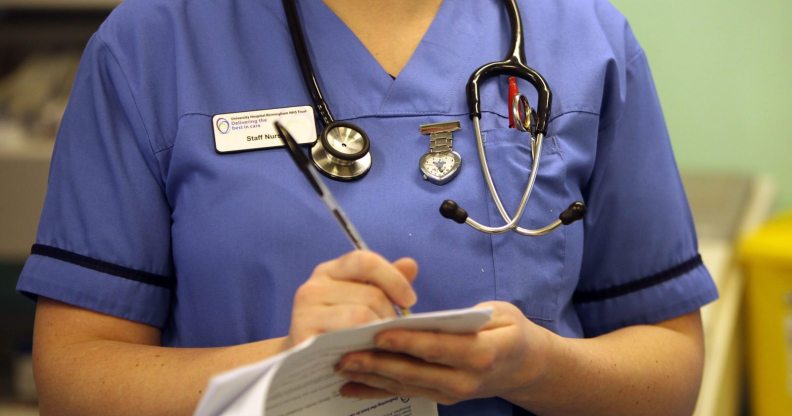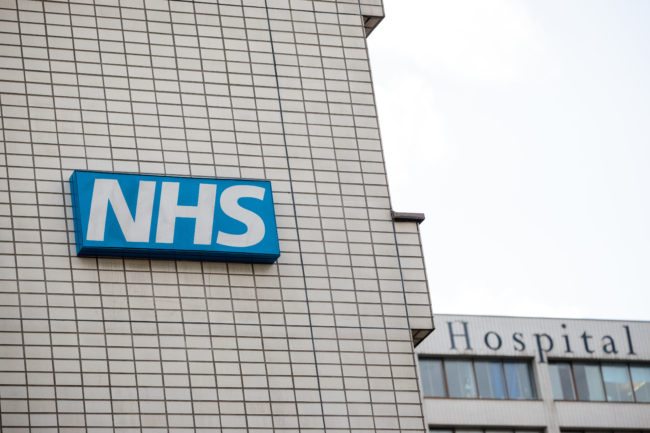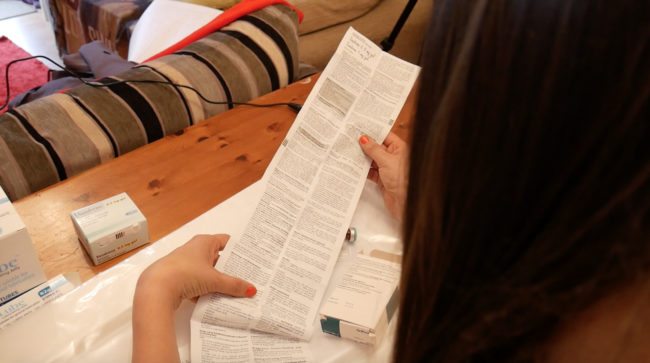Exclusive: Top doctor slams claims number of people questioning their gender is too high for NHS to cope

The depression rate is extremely high in the LGBT+ community (Christopher Furlong/Getty)
A top gender doctor has challenged the claims that there is “not sufficient capacity” in the NHS to deal with the number of people questioning their gender identity.
After James Palmer, the medical director for specialised services at NHS England told The Telegraph that nearly two million Britons will be expected to question their gender, fears have been sparked that the health service will not be able to work with patients who have gender identity issues.
“There are currently 7,500 adults waiting for an appointment with our services. No other specialist service has seen this growth, anywhere near. As a result there is absolutely not sufficient capacity in the system,” he told the publication.

National Health Service (Photo by Jack Taylor/Getty Images)
Founder of GenderGP Dr Helen Webberley has said that the demand is increasing due to social acceptance, and arguments over budgetary fears are “moot” as the NHS has already agreed to treat transgender patients.
“Everyone’s been saying for the last three years that the numbers have been increasing,” gender doctor Dr Helen Webberley told PinkNews.
“And that is a good thing, because of societal acceptance. We saw this when the gay community came out in the eighties, it went from being rare to commonplace – and that’s what will happen with transgenderism.
“What people forget is that we’re all on the gender spectrum in one way or another. The idea of how many transgender people are out there is a spectrum – we all could be – gender isn’t as binary,” she added.
Dr Webberley argued that the NHS has to “manage that business strategy” in order to meet the demands of people who are experiencing gender dysmorphia.

The instructions of Riley’s hormones (Photo by Darin Graham for PinkNews)
“Whether there’s a high demand or not, people have to manage that business strategy. The NHS agreed a long time ago to treat transgender patients, therefore not having the budget is moot,” she told PinkNews.
“You can’t suddenly say there’s so many people with blood pressure. You have to see them, there’s no question about it.”
At present, transgender people are demanded to live as their true selves for two years before they can be legally recognised as that gender.
The expensive process sees them redirected to a tertiary form of care in specialist centres, which is the most costly form of treatment available.

A doctor talks to her patient (stevanovicigor)
“ALL transgender care is done in tertiary centres – we need to bring it back to primary care. They don’t need to go past the GP. If it’s beyond hormones and the levels are not right, then secondary care in the local hospital is available,” Dr Webberley told PinkNews.
“We need to educate people at GP level. We know that these people know their gender inside out. At the moment, people are waiting two years to have their gender confirmed. These centres are designed for 500 patients a year. This does not fit the demand.”

@Mimmymum, who is a parent of a transgender child, said that trans children are expected to “get over” their gender difficulties and “ignore” the warning signs.”
“Surely it’s a good thing that young people who are questioning their gender are looking for support from the NHS – isn’t that exactly where they should be to get the expert support they need?” she told PinkNews.
“If you saw a rise in any health-related issue, you would expect the NHS to respond accordingly with appropriate services – why should this be any different in this case? Unfortunately, because this involves young gender-questioning and transgender people, it is considered by many as something they should just ‘get over’ or ‘ignore’ and they’re branded a ‘drain’ on NHS resources. Don’t our children deserve the same level of care as anyone else?”
Although NHS boss Palmer said he was concerned about the spike in patients, he said that younger people seeking help regarding their gender identity is “a good thing.”
“For a young adult, to be able to come forward, to seek that expertise, earlier [rather] than much much later in life, that’s got to be a good thing,” he said.
“We’ve got to be prepared to start thinking about designing a healthcare service that will allow somewhere around one to three per cent of the population at some point in their lives having a discussion about their gender,” he said.

